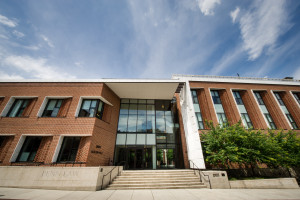Diversity, Equity & Inclusion at Penn Law
In July, Dean Theodore Ruger issued a statement to students, faculty and staff announcing some of the immediate actions Penn Law took to work internally and externally against racism and to promote meaningful change toward a more just reality. Since then, the Law School and its Office of Inclusion & Engagement (I&E) have continued the work to create a more inclusive community in the key areas of student support, capacity building, and racial justice programming.
Student Support
Increased financial support for students comes with the announcement of the newly created Dr. Sadie Alexander Scholarships. The three new scholarships will be available in Spring 2021 for incoming students whose education, experience, and professional commitments advance racial justice and honor the work and legacy of Dr. Sadie T.M. Alexander L’27, the first Black woman to graduate from Penn Carey Law.
“Available for application beginning in Spring 2021, these scholarships will be given to incoming students whose education, experience, and professional commitments advance racial justice and honor the extraordinary work and legacy of Dr. Alexander,” said Ruger. “They’re one part of a much larger strategy to ensure that our students have the support to advance equity and justice through their personal and professional endeavors, as Dr. Alexander did.”
Additionally, orientation programs this year included robust exploration of diversity, equity, and inclusion. I&E hosted a series of workshops on invisible norms and bias for all incoming JD students. In addition, all 1Ls participated in a panel on Law & Inequality, moderated by Kalpana Kotagal L’05 and featuring the Honorable Theodore McKee, as well as Professors Shaun Ossei-Owusu and Karen Tani. In partnership with law student affinity groups, I&E also hosted several panel presentations focused on the needs of students from groups historically underrepresented in law school and the legal profession at large. These panels engaged numerous faculty members who participated in robust Q&A with students about the law school experience.
Achieving Racial Justice Series & Programs
In the past months, the Office of Inclusion & Engagement teamed up with the Toll Public Interest Center (TPIC), the Quattrone Center for the Fair Administration of Justice, and other law school partners to launch the yearlong colloquium, Achieving Racial Justice. This summer, the series brought two virtual events: A Path for Change: Policing in America and Structural Frustrations: Challenges to Implementing Change. Hundreds of attendees virtually attended both panel discussions, which explored the local and national issues surrounding racial justice and police reform in America. The series also included a recent discussion of Voting Rights and the 2020 Election, and will next feature The Administration of Blind Justice: Criminal Justice Institutions and Racial Bias, on November 11th.
“This Colloquium has been an incredible opportunity for collaboration across the Law School to advance the conversation regarding racial justice,” said Arlene Rivera Finkelstein, Associate Dean for Justice & Inclusion Initiatives and TPIC Executive Director. “The Quattrone Center, TPIC, I&E, and other Centers, faculty, staff, and students will work throughout the year to convene thought leaders who will deeply examine our country’s longstanding inequities with a solution-oriented focus so that we can work together to advance change.”
Alumni Engagement
The Alumni Advisory Board for Inclusion & Engagement has been an active and important partner for the Law School. Wrapping up their inaugural year, the group has helped I&E set priorities, been a strong resource for the Law School on matters of equity and inclusion, and has taken opportunities to connect with students. The Advisory Board, comprised of 25 members, including five co-chairs, has worked to set a strong foundation for alumni engagement in these critical issues. Board members will have a virtual convening in December, after which they look forward to updating their fellow alumni on their work to support equity and inclusion at the Law School.
I&E, whose team includes Rivera Finkelstein, Monica Monroe, Associate Dean for Inclusion & Engagement; and Professor Tobias Wolff, Deputy Dean for Alumni Engagement & Inclusion, works not only with the Alumni Advisory Board, also work with a Staff Inclusion Team and Student Advisory Board.
These recent initiatives, which have focused on increasing support for students, advancing conversations about racial justice, and examining physical spaces on campus, are just the latest steps in a larger, long-term plan to create real, lasting change.





